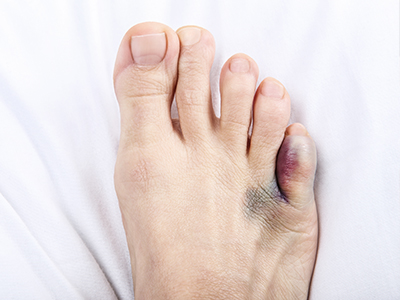


Definition and Cause
Few injuries to the foot produce more pain than that of a fractured or broken toe. The mechanism or cause of a toe fracture seems embarrassingly obvious yet seemingly unavoidable. A sudden blow or stubbing of a toe against a heavy non-yielding object, an impact injury involving something dropping on top of a toe or that common injury of catching a small toe on the leg of a piece of furniture in your bedroom can each cause a fracture. The toe hurts high on the pain scale, swells and turns reddish pink, and after a day or so takes on a bluish bruised type of discoloration. If these signs are present and you just don't want to move that toe, then the chances are that you have a fracture.
Treatment
It is at this point that we frequently find an area of public confusion regarding the treatment of toe fractures. Many of our patients and those not seeking medical care believe that toe fractures will heal by themselves and do not really need supervised medical attention. They tell us that there is nothing to do about a broken toe except tape it to the next toe. We disagree and would like to point out several facts on this issue.
In closing, these injuries occur with sudden onset, extreme pain, and obvious shoe wear difficulties. Proper evaluation, management, and periodic monitoring are recommended procedures for this problem.